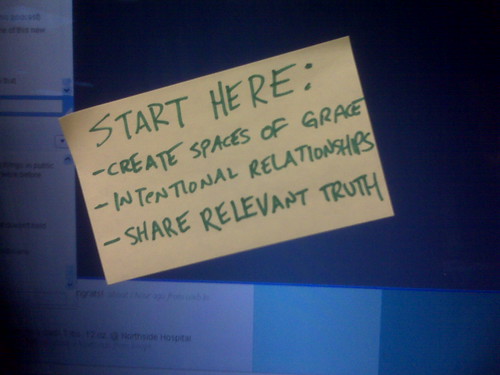
Phil Vischer (creator of Veggie Tales) has started a great new online venture in recent months :: Jelly Telly.
On his blog last year he walked through several of the big problems facing kids and media – specifically Christian kids and Christian media.
One of the problems he points out is that Christians are defined by what we hate – not who or what we love.
…there has been a price for this political focus. Today, 80% of non-Christians in America have a negative view of Christianity. When asked what word first sprang to mind when the term “Evangelical Christian†was mentioned, the number one answer from young adults in America was not “loving†or “self-sacrificing,†but rather, “homophobic.â€
He also points out that most Christians aren’t really living out what it really means to be a follower of Christ and that Protestant Christians can no longer define “grace.”
So issue number one – we need an education.
Since God has given Phil a passion and a burden for kids, he naturally wants to begin this education with kids (hence Veggie Tales).
Issue or problem two – there’s no platform for Christian Media. There’s no American Idol, Nickelodeon or Disney for Christian media creators to launch their characters from. People aren’t walking into Christian bookstores like they used to and with the constant barrage from other media sources the Christian media content is quickly getting drowned out.
He also mentions that without platforms to launch media from, the creators aren’t likely to create the content. Sure a 24/7 cable network for kids would be great, but as Phil mentions, it could easily cost $100 million to get off the ground.
So along with these issues and the fact that Phil seems to feel the tugs of an “upside down King and Kingdom” interested in doing amazing things with Mustard Seeds (my words not his), he’s launched a new online network for kids.
I’ve checked out the site and I think it has a lot of things going for it…
First off, I like that (so far) they’re not trying to sell kids a bunch of products. I’m guessing that may change in the future as you have to find sponsors for any successful venture at some point. UPDATE: From the February news there might be a subscription service setup in the future – Phil suggested a $3 a month subscription possible but there are other ideas in works as well.
Secondly, they’re using video to tell God’s story. I’m always going to enjoy that.
Third, they’re using a medium kids are familiar with. What kid these days doesn’t know how to surf the Internet?
Fourth, they’re starting small. Like I mentioned before, I think God is about the Mustard Seed and doing things in an upside-down manner that the rest of the world may not understand. The web is the perfect launching pad for whatever God may have laid out for Jelly Telly in the future. As a friend told me this week – the Internet is the new Roman road. The network is already in place for sharing God’s story – we just have to put it to use.
Now personally, I’m not typically a big fan of “Christian alternatives” to everything the world puts out (i.e. “Christian music,” “Christian movies,” “Christian video games”) but I think this may be more inline with a real need. I personally like to believe that God’s truth can be found in everything but I can’t expect an eight year old kid to see that or understand it either. I think that at this point in my life I’d rather know that for the kids I care about, they’re getting that truth in easy bite-sized packaging without having to decipher it from all the rest.
Check out the site and/or bring a kid over to check it out for you. Let me know what you think.
And in the meantime, here’s a quick “About us” video for all the parents…

 ).
).